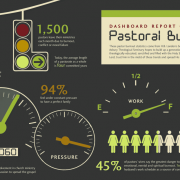SAINT PATRICK: INTERNATIONAL MAN OF MYSTERY
Saint Patrick, the great fifth century Christian missionary to Ireland, has historically been a most intriguing and obscure figure to the Christian church, as well as the entire world. Countless myths and legends have been told about this man. Many poems and stories have been written about him. Many theologians and missiologists have debated extensively on his religious allegiance and missionary philosophy. The question is can anything be agreed upon about Saint Patrick? In all of the hype and interest generated by his life and mission, is there anything that can be known for sure about him in the twenty-first century?
This writing is an to attempt to give an account of the facts generally agreed upon by students of this intriguing man with the goal of painting as accurate a picture of his true life and mission as possible. The life and mission of Saint Patrick are a most fascinating and edifying study, and I’m excited to share some of what can be known about them.
WHEN PATRICK WAS A WEE LADD
Patrick was born sometime in the late fourth century between the years 385-390 A.D. in the area known today as northeast England. His people were called Britons. They were a Celtic people that had been Romanized under the Christian Roman Empire which in part encompassed modern-day England. Thus, Patrick was culturally very Roman and disconnected from his Celtic roots. The Britons spoke mainly Latin and an early form of Welsh. Patrick was born into an aristocratic, wealthy, and religious family. His father, Calpurnius, was a deacon in the Roman Church and owned at least two estates. Not much is known about his mother.
Patrick seems to have been a fairly average boy in his early childhood. He went to school where he learned Latin (the common language at the time due to the influence of Rome) and Welsh, which was the more native and peasant tongue of the British Isles. Though his parents were actively involved in church and Patrick had grown up going to Mass, Patrick was at best a very lukewarm Christian in his younger days. Through a series of tragic events set in motion when he was a young man, his life, and especially the state of his lax Christian devotion, would change forever.
FROM RICHES TO SLAVERY
When Patrick was just sixteen years old he was taken captive along with many of his family’s servants when Irish pirates raided one of his father’s estates near the west coast of Britain at a town called Bannavem Taberniae. Patrick was forced onto a ship which sailed away to Ireland where he was sold in the slave market to a tribal chief and Druid named Miliuc Moccu Boin. The chief put Patrick to work tending his cattle herds in the Irish countryside.
Patrick remained enslaved for six years. It was during this time that he came to know the truth of Romans 8:28— “And we know that God causes all things work together for good to those that love God, to those that are called according to His purpose…” in experience. In his book, The Celtic Way of Evangelism: How Christianity Can Reach the West Again, George G. Hunter writes about the three key changes that Patrick went through during his time in captivity:
“During his years of enslavement, Patrick experienced three profound changes. First, the periods when Patrick was isolated in the wilderness herding cattle connected him with what theologians call the ‘natural revelation’ of God. He sensed with the winds, the seasons, the creatures, and the nights under the stars the presence of God; he identified this presence with the Triune God he had learned about in the Catechism. In his more or less autobiographical ‘Declaration’ Patrick tells us, ‘After I had arrived in Ireland I found myself pasturing flocks daily, and I prayed a number of times each day. More and more the love and fear of God came to me and my faith grew and my spirit was exercised, until I was praying up to a hundred times every day and in the night nearly as often.’ Patrick became a devout Christian and the change was obvious to his captors. Second, Patrick changed in another way during the periods he spent with his captors in their settlement. He came to understand the Irish Celtic people and their language and culture…Third Patrick came to love his captors, to identify with them, and to hope for their reconciliation to God. One day, he would feel they were his people.”
MIRACLES IN SUCCESSION
Thus, Patrick was converted, and now God had plans for him. In the sixth year of Patrick’s captivity he received a vision from God in which he was told that he was to escape his slavery and that a ship was waiting to take him home to Briton. A voice told him, “You are going home! Look! Your ship is ready!” Patrick rose from his sleep and fled from his captors to find a ship waiting for him. He attempted to acquire permission to sail home on the ship but the captain refused him. Patrick began praying and he tells us in his aforementioned Declaration that before his prayer was even completed God had changed the captain’s heart and he began calling for Patrick to come aboard. So Patrick made the 200 mile trip back to his homeland and people in Briton as the Holy Spirit had prophesied to him.
Once back home Patrick had hardly settled in when he would receive another word from God, this time functioning as his call to be the first missionary Bishop to Ireland, his place of captivity. John Holmes documents the extraordinary event:
“One night he had a vision in which he saw a man named Victoricus coming to him with a great number of letters. He read the title of one which said, ‘THE CRY OF THE IRISH’ and at that moment he seemed to hear the voice of the people who lived by the Wood of Volcut which is by the western sea. Unitedly they said, ‘Holy youth we are asking you to come and walk among us again.’ Patrick was so moved that he could read no more…It would seem that from that moment there was born in his heart a burden to bring the Gospel to that nation from which he says, pointedly, ‘I was only just able to escape.’”
TRAINING FOR THE MISSION FIELD
Upon receiving this divine commissioning Patrick determined to prepare himself for his destiny as a missionary to Ireland. He began studying the Celtic people and Irish language intently as his heart flamed for them. He also began to be very active in his local church. He became a Deacon and in a short time was elevated to the office of Bishop. Shortly after receiving his bishopric he left his homeland again for Ireland; this time not as a captive of pirates, but as the slave of Christ for the Gospel to the Irish. It was the year 432 A.D.
NEW CULTURES AND NEW METHODS
The Irish people that Patrick would serve were, in Roman terms, very much uncivilized. They had no organized cities, no real road systems, and they had no unified form of government. They moved in small nomadic groups through the rough countryside and forests of Ireland living off the land. The people lived in tribes (clans) that consisted mainly of extended family. Patrick knew that he would have to be innovative when it came to ministering to them. He would not be able to simply plant parish churches in the traditional sense near a populated city as the Church had done everywhere else. There were no such cities. He had to find new methods to reach a different culture.
So what did he do? Patrick’s method of reaching these tribal nomadic people was what we would call “contextualization” in missiological terms today. It seems that his practice was to seek out the leaders of the tribal settlement he went into in hopes of either converting them or at least getting permission to serve amongst them for strategic purposes. Next, he would engage people in conversation and service ministry for relationship building while looking for receptive individuals within the clan. He would pray for physically impaired and demon possessed people as well as assist in mediating conflicts between tribesmen. He would engage in open air preaching.
In all of this he did a great deal of contextualizing. For example, the Irish people were very musical and poetic, so Patrick employed the use of these art forms which made sense to them culturally in an attempt to communicate the truth of the Bible in ways they would understand. He wrote worshipful lyrics set to Celtic tunes for them to sing and portrayed biblical images for them in Celtic forms of visual arts. This enhanced his ability to communicate the message of Jesus to them effectively.
As groups of people began to be born-again through Patrick’s gospel teaching, instead of forcing them to become culturally Roman he would allow and encourage them to express the essence of real Christianity in Celtic forms. The most fascinating way he did this was by creating what Hunter calls “monastic communities” instead of Roman cathedrals. These were essentially the native Irish version of a church-plant. The monastic community lived the Christian life together in a circularly built fort. They would meet multiple times a day for worship and prayer, and in the evening for a biblical message every night. They lived together, worked together, ate together, and worshiped together. It was an extremely tightly knit body of believers that lived all of the Christian life in vibrant spiritual community. In his book Church History in Plain Language,Bruce Shelley said of these communities that, “…the monastic community, maintaining itself on the land, fitted the agricultural communities of the Celts better than the parish-church system so common in the Roman Empire.”
A NEW COMMUNITY
The main method of outreach from within the monastic community was that of hospitality. They had a guest house in a sectioned off portion of the community that was by far more comfortable than any other dwelling used by the believers themselves. They would love and serve every visitor that came to them and live the life of Christ out before them. Patrick considered himself and the believers in these communities accountable to God to serve this way because of his biblical conviction that believers are each a “letter of Christ.” He wanted the message of the love of Jesus to be communicated without words to unbelievers through their lifestyles of love and grace. They wanted to influence the lost into the faith by extending the love and Person of Christ to them in behavior and community.
IMPACT OF THE WORK
Patrick’s method of contextualizing the gospel in presentation and the essence of Christian community in Celtic cultural expression proved very successful in the conversion of massive amounts of Irish people. Though much of Ireland is said to have remained unconverted upon his death in 460 A.D. there is thought to have been thousands of Christian converts in Ireland due to his ministry. Some estimate that there may have been as many as one-thousand believers in some of the individual larger monastic communities.
PAIN IN THE JOURNEY
However, in spite of Patrick’s success in Ireland, his missionary years spent there were not all easy. In his Declaration Patrick writes of being persecuted, slandered, and even enslaved as many as three more times during his ministry. Things weren’t always easy for his converts either. In fact, one of the two original writings of Saint Patrick (unanimously held as authentic by scholars) which the world has access to today is a letter in which he rebukes a local ruler for allowing his men to brutally murder and pillage a group of freshly baptized believers and to sell their young women.
Clearly the most cutting opposition Patrick endured during his ministry was that of the disapproval of his tactics later expressed by the very church and people who had once affirmed and sent him out to serve Ireland. The traditional minds of the people in his hometown did not accept Patrick’s replacing of the culturally Roman aspects of Christianity with culturally Celtic expressions. Patrick clearly wrote from a distressed heart in addressing this issue in his Declaration.
The far-reaching missional impact of Saint Patrick’s ministry is impressive. Historians point to Ireland as becoming a mission work launching pad for years to come after the death of Patrick. It served as the home-base for missionary endeavors for the eventual evangelization of Britain, Germany, and Switzerland to name a few. An example of the great Irish missionaries that are said to have been products of Patrick’s work years earlier were men like Columbanus. A century after Patrick, Columbanus led the missionary charge into the above mentioned countries and established them as centers for evangelistic efforts.
WHICH SIDE ARE YOU ON ANYWAY?
Another thing that has been perpetuated throughout history ever since Patrick’s death is what seems to be a never ending debate between Catholics and Protestants over whether or not Patrick was what people today would consider a good Catholic or more of today’s evangelical theological persuasion. Patrick seems to be an interesting mix of both camps. While he was certainly an ordained Bishop in the Roman Catholic Church of the Holy Roman Empire (which certainly means he had practices and beliefs in common with today’s Catholicism), even a quick reading of his Declaration makes clear that his single most emphasized teaching was that of the simple gospel of grace. That fact shows that he was very evangelical even though the term was not yet used. It seems he was Roman Catholic by tradition, but evangelical in the essence of his gospel faith. This is abundantly clear from this quote taken from his Declaration in which he wrote of his purpose and success, “For I am very much God’s debtor who gave me such great grace that many people were reborn in God through me and afterwards confirmed, and that clerics were ordained for them everywhere, for a people just coming to the faith, whom the Lord took from the utmost parts of the earth as he once had promised through his prophets.” The words “grace…reborn…and faith” in this quotation say it all.
SEEING GOD AND HOPE IN THE EXPERIENCES OF SAINT PATRICK
Patrick’s life serves as a reminder to us that our circumstances are never out of the plan or control of God. Patrick was taken prisoner when he was just sixteen and was in captivity until he was twenty-two. I think Patrick must have been confused and lonely and wondered at times (even after his conversion) if God could or would help him. Yet, by the end of Patrick’s life it is absolutely clear that his time in captivity is exactly what he needed to go through to become the missionary warrior God wanted him to be. God was there the whole time working things out for His glory and Patrick’s good, no matter how bleak things probably seemed.
I have certainly never experienced anything like being taken captive for six years, but I have been through things like family divorce, physical affliction, and more. So in terms of application, I believe God would remind us through the life of Saint Patrick that our past is not an accident, and our present and future are not out of God’s control. God has allowed or caused everything we come into contact with because he wants to use it now or in the future to prepare us to effectively serve others for His glory. This is the truth in our hardships.
Bibliography
Holmes, J. M. The Real Saint Patrick. Belfast, N. Ireland: Ambassador Productions, 1997.
Hunter, George G. III. The Celtic Way of Evangelism. Nashville, Tennessee: Abingdon Press, 2000.
Shelley, Bruce L. Church History in Plain Language 2nd Edition. Nashville, Tennessee: Thomas Nelson Publishers, 1995.











